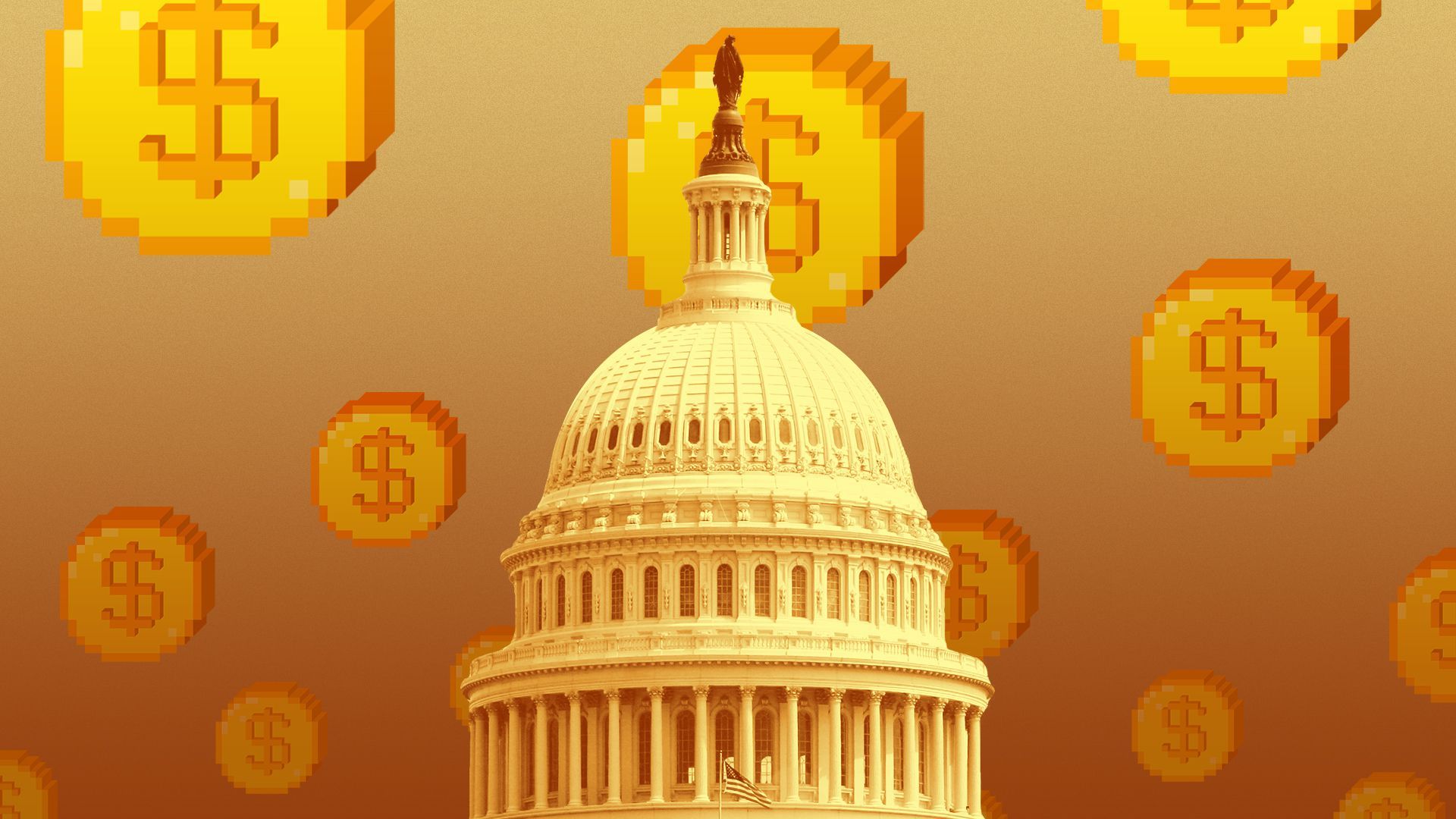
Illustration: Shoshana Gordon/Axios
Stablecoins — the supposedly safe tokens that are the real currencies of the crypto world — pose a growing risk to the economy and financial markets. The House Financial Services committee is holding a hearing today to gather information and explore legislative fixes.
Why it matters: Stablecoins are increasingly intertwined with important elements of our financial system. That means problems in this market could ultimately become the government's headache — and could even prompt a backdoor bailout of the crypto economy.
The backstory: Stablecoins are cryptocurrencies designed to maintain a steady value — essentially $1 — rather than fluctuating wildly like Ethereum, Bitcoin, Dogecoin and other cryptos.
- Stablecoins are typically borrowed, lent, and spent on crypto-trading platforms. The best known stablecoins are Tether, issued by a company of the same name, and USDC, created by payments company Circle.
- The stablecoin market grew by about 450% last year, to roughly $155 billion, according to Fitch Ratings.
How it works: When someone buys a stablecoin, they give cash — genuine American bucks — to a company that issues the token. Consumers typically buy stablecoins because many crypto exchanges don't allow traders keep their uninvested balances in actual dollars.
- After that, the stablecoin issuer socks away the dollars it collected as collateral — or at least that's what they say they do. They're meant to put the cash in a bank, or buy safe, short-term investments like Treasuries or a type of corporate debt known as commercial paper.
- The existence of the safe collateral is supposed to ensure the stablecoin's value stays, well, stable.
Yes, but: It's effectively the Wild West out there — no rules exist that ensure those dollars actually are socked away for safe-keeping.
- But, you know, sometimes the money isn't really there.
Because there's no certainty about whether collateral actually exists, stablecoins are extraordinarily susceptible to what is known in the financial world as a "run."
- In the case of stablecoins, that would mean that if consumers couldn't redeem their tokens for real dollars, it could set off a stampede of investors all trying to simultaneously get their money back.
The impact: When a run on stablecoins happens, issuers will rush to sell the short-term debt they own (like commercial paper) as they try to come up with dollars to hand back to those who want to swap stablecoins for real money.
- The ability to sell short-term debt like commercial paper (CP) can become difficult during this type of crisis, as the selling volume craters prices.
- This is a problem! Commercial paper is an important market! It's where companies go for short-term borrowings — and if the CP market collapses, it will make it more difficult for real companies to raise real money to do real, non-crypto things.
In a worst-case scenario, that could spiral out further, with a collapse generating additional runs in other products that invest heavily in CP.
- In recent years, those sorts of runs have prompted a series of bailouts.
The other side: Norbert Michel, director of the Center for Monetary and Financial Alternatives at libertarian-leaning Cato Institute, argues that stablecoins need a light regulatory touch.
- Regulations should focus on transparency and disclosure, so stablecoin buyers know there's a chance they don't get their money back, he says. "We should let investors take their own risk," he adds.
Our thought bubble: Stablecoins could destabilize important markets. Runs almost always force the government to take action to keep market disruption from destabilizing the real economy.
- Since stablecoins underpin crypto trading, a run on stablecoins would almost certainly generate a sharp decline in the prices of highly speculative cryptoassets like Bitcoin and Ethereum.
- That means a bailout out of stablecoins would act, effectively, as a backdoor bailout of bitcoin traders — and the deregulated, and often shady world of crypto finance.
The bottom line: Regulations are needed. A recent report from the President's Working Group on Financial Markets asked Congress for regulation and said "failure to act risks growth of payment stablecoins without adequate protection for users, the financial system, and the broader economy."
- Nellie Liang, Treasury Department undersecretary who spearheaded that report, will testify at today's House hearing.
